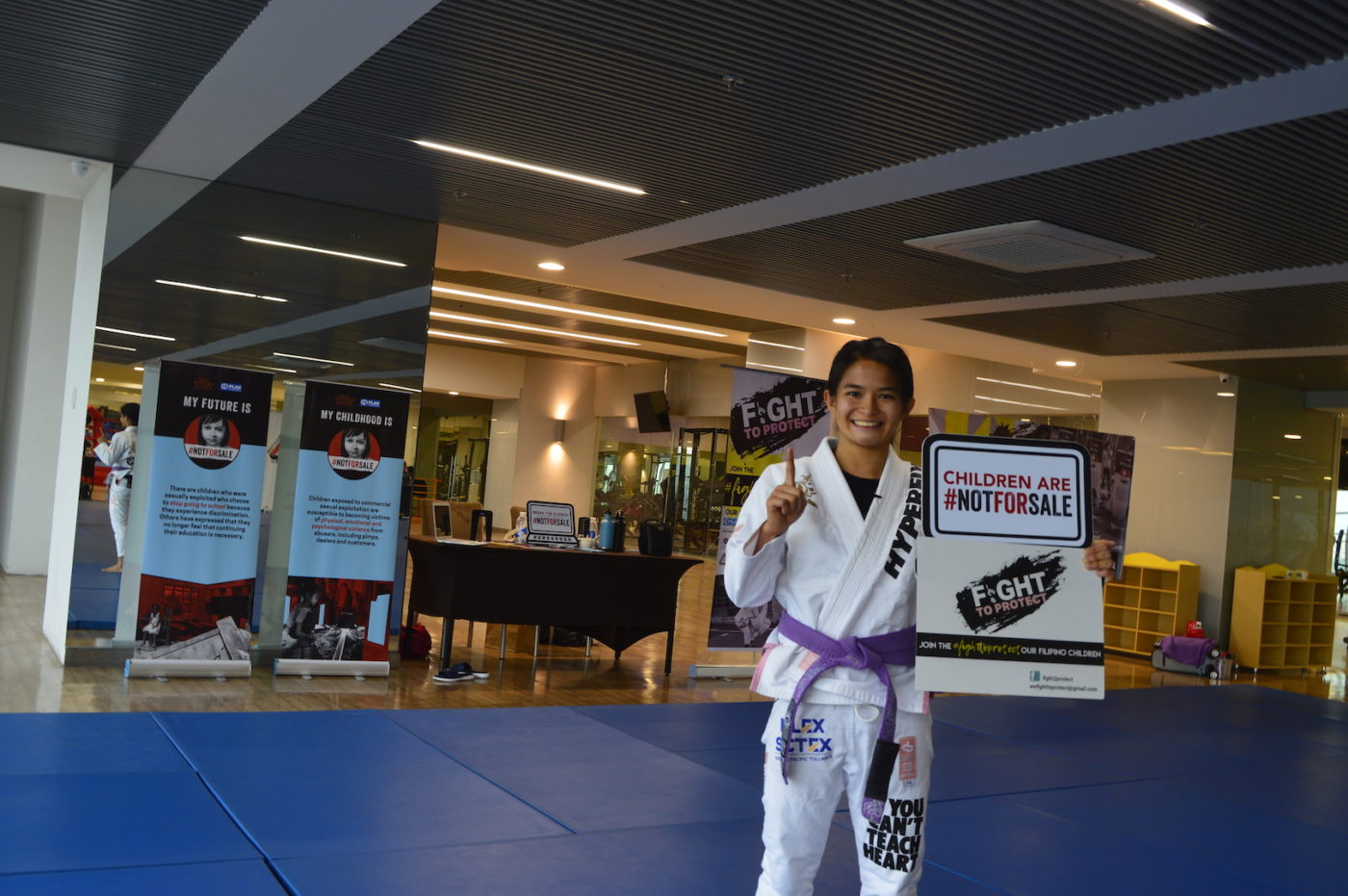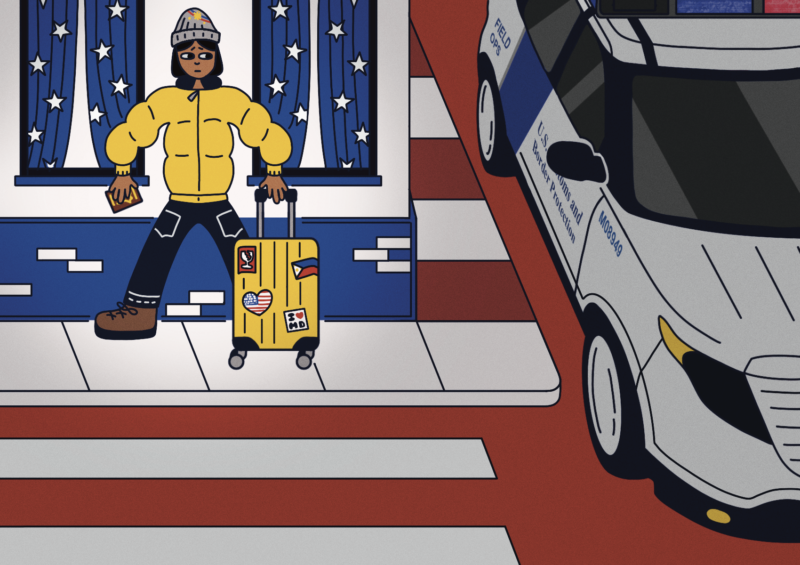The match begins with two grapplers squaring off: From a standing position, the two shake hands, plant their feet on the mat, and race frantically to get a better grip on the other’s garment. The hustle is eventually taken to the ground, as they grapple for the upper hand and plot the next takedown. Despite the disparity in strength, the smaller grappler eventually triumphs through agility and skill.
The fight ends, and the two shake hands again.
In a departure from other martial arts, Brazilian jiu-jitsu (BJJ) emphasizes skill over size. This makes the sport ideal for defense against larger aggressors. “Whatever your body type is, you can actually excel in this sport,” says Meggie Ochoa, the five-foot-tall BJJ world champion. “It’s really focused on technique.”
However, the jiu-jitsu ace is channeling her passion and skill in BJJ to tackle a disembodied but more insidious opponent. Ochoa (BS MGT ‘12) is the founder of “Fight to Protect,” a movement which raises awareness on child sexual violence and empowers survivors through sports.
“Jiu-jitsu has that unique capacity to empower a human being,” she says, in reference to the sport’s ability to allow even smaller individuals to fight back. “It gives you the message [that] whatever the situation, you can do something about it.”
More than medals
Still in her gi, a type of kimono used in the sport, Ochoa traces the beginnings of her journey to mixed martial arts (MMA), which she picked up as a hobby after graduating from college. From there, she eventually focused on BJJ instead, as she felt this offered more competitions for women. “I’ll get to compete more if I’m in jiu-jitsu,” she says.
Last November 25, Ochoa became the first Filipino to win the gold medal in the 2018 World Jiu-jitsu Championships. She is also a three-time International Brazilian Jiu-Jitsu Federation (IBJJF) world champion and a bronze medalist in the 2018 Asian Games.
Though it seems like Ochoa’s athletic journey has been on a constant upward trajectory, she says it has actually been “up and down.”
“After winning the World Championship in 2015, that’s when I started thinking about the question of purpose,” she says. “What is all this for?”
This question of purpose eventually led her to launch Fight to Protect. In partnership with Safe Haven Community Center and Children’s Home, Ochoa has helped implement a BJJ learning program for abandoned, neglected, and abused children, as part of their rehabilitation.
Through a striking application of sports, Ochoa has brought attention to her advocacy by drawing from her own expertise and experiences as an athlete.
“The problem is sometimes if you raise awareness using the issue itself, people are not interested or [they] shy away from it because of the intensity,” she says, adding that CSA is often considered a taboo topic in the Philippines, making some hesitant to engage it.
The force of the impact
The technical skills—learning how to execute a perfect throw, the arm bar, or different grappling techniques—are definite selling points for someone looking into BJJ. But for Ochoa, the sport teaches something more valuable.
“That same kind of a mindset, that same heart, that same passion, you use not just on the mats,” she says. “You actually translate that in fighting for the children, in fighting against the issue.”
In forming Fight to Protect, Ochoa says, “Kaya nga tinawag na naming movement (That’s why we call it a movement)… it’s a more loose term than a campaign. Kasi ‘movement’, it encourages the maximum amount of people to get involved.”
To raise more student support for the movement, Ochoa partnered with TUGON Ateneo, an organization in the Loyola Schools which promotes the psychosocial development of CSA and child abandonment survivors. Last October, the organization hosted a BJJ self-defense class together with PLAN International, which advocates for children’s rights and equality for girls.
The event was held as part of Talakayang Alay sa Bayan (TALAB) 2018, Ateneo’s university-wide effort to get students involved in issues beyond its campus. Ochoa taught basic BJJ to the participants at the invitation of Moniq Reyes, TUGON president and psychology senior.
An athlete herself, Reyes is a former Ateneo varsity swimmer who champions the same advocacy. “I kind of understand that sports has a really big platform [which] gets heard,” she says. “Why not put your advocacy in it?”
While being part of the swimming team was personally fulfilling for Reyes, the student-athlete yearned to do something beyond herself. She joined TUGON with no intention of becoming an active member. Years later, she now leads the organization.
“We have seven partner institutions,” she says. “We all try our best to go to them [in] area engagements, as well as offer the help we can, may it be time, monetary, or in-kind.”
In TUGON’s flagship project, National Child Sexual Abuse Awareness Week, Safe Haven’s BJJ learning program has taken a new direction, as the kids themselves taught the sport to other children.
“Of course, they [want to] win world titles, they [want to] be world champions,” Ochoa says. “[But] their dream is actually to teach other kids jiu-jitsu.”
Call to action
Beyond the mats and gis, what both Ochoa and Reyes can get behind is an active and deepened participation in the advocacy.
When asked how students and non-athletes can contribute to Fight to Protect, Ochoa says that speaking out through online campaigns, such as #EndChildRape by Child Rights Network Philippines, is a good place to start. That campaign aims to legally increase the age of consent to sexual acts in the Philippines, which at age 12 is among the lowest worldwide. “A simple way to get involved is to sign the petition,” Ochoa says.
More than any one organization or athlete, however, the fight to uplift survivors of CSA and abandonment can only be won if each one looks beyond himself and speaks up. “It’s not about [just] being part of an org,” says Reyes. “You can have your advocacies in your own way.”
The former varsity swimmer emphasizes the importance of giving a face to advocacy. “When you’re in Ateneo, you see all the [profile picture] blasts and posts [about the children],” Reyes says. But if the involvement stops there, she says, one may run the risk of thinking about CSA and child abandonment in terms of “statistics,” and not people.
In area visits to organizations such as Safe Haven, children become more than just numbers. “Our partner institutions are there to really concretize what we’re fighting for,” says Reyes. “Hindi na lang kuwento yung naririnig mo (What you’re hearing becomes more than stories).”
Aside from area visits, Ochoa says that those who aspire to be involved may also volunteer for Fight to Protect. “We understand that every person may be skilled differently, may have different resources, may be talented in a different way,” she says, but each one can contribute to the fight nonetheless.
Addressing people who may be hesitant to join the movement, Ochoa shares that she was not always the child advocate that she is today. Like many, the BJJ world champion had hesitations about speaking out on such a taboo topic. “I was very different in college,” she says. “I was an athlete more than I was anything else.”
Yet, Ochoa eventually changed her mind, and has become an ardent advocate for children. Through Fight to Protect, she encourages athletes and non-athletes alike to do the same.
In the end, Ochoa’s battle lies not on the mat. It lies in people’s minds, and in getting them to join the fight, too.
ERRATUM: Ochoa became the first Filipino to win the gold medal in the 2018 World Jiu-jitsu Championships, not the first Asian. The article has been edited accordingly. We apologize for the oversight.
What do you think about this story? Send your comments and suggestions here: tgdn.co/2ZqqodZ







